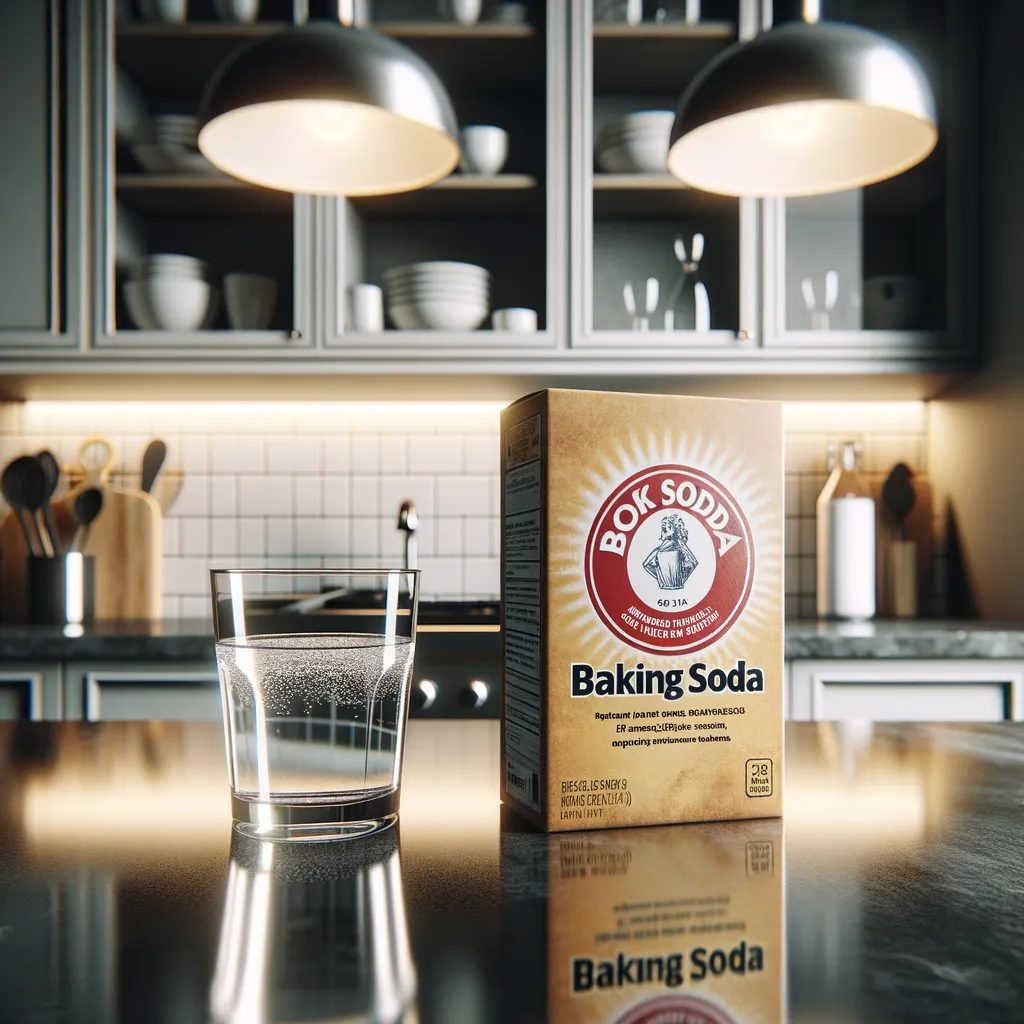You Won’t Believe What Baking Soda Can Do! Discover 12 Surprising Uses That Will Change Your Life
Key Points
- Baking soda, or sodium bicarbonate, is a natural alkaline compound with antibacterial, antifungal, antiseptic, and anti-inflammatory properties. It is a jack-of-all-trades regarding health uses, from oral health to digestive disorders.
- It acts as a buffering agent, neutralizing acids to aid the body in maintaining a proper pH balance. This property makes it a very effective treatment for heartburn, indigestion, and other acid-related conditions.
- Baking soda offers some truly amazing health benefits. It supports kidney function, acts as an antibacterial for oral health, relieves muscle soreness, and helps regulate pH levels in the body. Further, it is a natural exfoliant for skin and an oil-cleansing agent for hair.
- Use baking soda according to recommended dosages to avoid potential health risks and get health benefits. To relieve indigestion, dissolve 1/2 tsp in water, and for urinary tract infection symptoms, take 1 tsp in water. However, consulting a healthcare provider is always a necessity, especially if you are on medications or have chronic conditions.
- Taking too much baking soda can cause side effects like gas and bloating or, in extreme cases, metabolic alkalosis. As with any potential health hazard, moderation and an awareness of one’s health conditions can keep risks at bay.
- Scientific research has proven that baking soda has many health benefits. It is wonderfully effective at improving kidney health, enhancing athletic performance, and reducing stomach upsets. Proper dosing is essential to maximizing these benefits.
- Ideal for Baking: Made with fine baking soda particles from Grade 1 baking soda to create fluffier recipes; Elevate your baking and enjoy great results with ARM & HAMMER Baking Soda
- Made in USA: Pure baking soda made in Green River, Wyoming that’s ready for baking; Manufactured with a focus on using locally sourced ingredients, renewable electricity, and water from the Green River Basin
- Pure & Natural: Free of harsh chemicals, gluten free, kosher, and can be used in organic baking; ARM & HAMMER is America’s #1 trusted baking soda brand
- 100+ Uses: Hundreds of other uses around your home including cleaning, health and beauty, deodorizing, crafting, and more; Your go-to, multipurpose solution for cleaning and deodorizing around your home
- The ARM & HAMMER Promise: We take care of the planet and create products you know and trust; ARM & HAMMER Baking Soda is certified carbon neutral* *By measuring our carbon footprint and reducing it to zero through internal reductions and offsets
Last update on 2025-12-22 / Affiliate links / Images from Amazon Product Advertising API
Baking soda, or sodium bicarbonate, has many practical health uses, which is why it’s ubiquitous in most households.
It treats everyday problems, such as heartburn, by neutralizing stomach acid to provide fast-acting relief from pain and irritation.
As a natural exfoliant, it gently sloughs away dead skin cells for smoother skin sans irritating ingredients.
Many people use it as a topical soothing remedy for bug bites. Its gentle anti-inflammatory qualities soothe minor skin irritations.
Gargling with baking soda helps freshen breath and improves oral health by balancing pH levels. These clever uses of baking soda, from the kitchen to oral health, show just how powerful and versatile this inexpensive ingredient can be.
Save it for your daily health needs; it’s saving the world!
What is Baking Soda?
Baking soda, scientifically known as sodium bicarbonate, is a natural alkaline compound with incredible health benefits.
Derived from nahcolite, a naturally occurring mineral, this versatile substance is available worldwide, with commercial deposits in places like California and Colorado.
Its healing properties include antibacterial, antifungal, antiseptic, and anti-inflammatory effects, making it a popular choice for various soda uses.
This magical compound relieves digestive issues due to its alkalinity, effectively neutralizing stomach acids.
Additionally, drinking water with baking soda can promote hydration and improve oral hygiene.
Its gentle abrasiveness makes it a common ingredient in homemade toothpaste. This toothpaste helps combat cavities, plaque, and bad breath, ensuring better dental health.
Baking soda is a multi-purpose health tool with a wide array of benefits.
Whether used in a baking soda bath or as a mouthwash, this compound can enhance overall well-being while addressing various health concerns. Its remarkable versatility truly makes it an essential item in any household.
Chemical Composition of Baking Soda
Sodium bicarbonate, with the chemical formula NaHCO₃, is a natural buffering agent that helps keep the body’s pH levels balanced. Its unique structure allows it to neutralize acids and work on conditions such as acid reflux or heartburn.
Clinical studies underscore its promise for medical uses. For instance, it’s been shown to correct hypobicarbonatemia in patients with chronic kidney disease. Sodium bicarbonate dissolves easily in water and can increase hydration.
Research indicates it may increase plasma volume by 3.5 percent.
Common Names for Baking Soda
Baking soda, also known as sodium bicarbonate, is a versatile substance that serves various purposes beyond health. It acts as a leavening agent in baked goods.
It creates a baking soda mixture for homemade toothpaste, showcasing its cleaning power and beneficial properties in cooking and personal care.
This alkaline substance is also a key ingredient in many do-it-yourself household remedies, from natural deodorant to baking soda baths.
It effectively deodorizes and soothes skin irritations while maintaining overall hygiene.
- Cross, Cecil (Author)
- English (Publication Language)
- 114 Pages – 06/28/2016 (Publication Date) – CreateSpace Independent Publishing Platform (Publisher)
Last update on 2025-12-22 / Affiliate links / Images from Amazon Product Advertising API
Health Benefits of Baking Soda
Baking soda—known as sodium bicarbonate—has many health benefits, thanks to its alkalinity and all-purpose nature. When used safely and sensibly, it is a powerful adjunct treatment for numerous ailments while promoting general health and well-being.
Below, we discuss specific uses supported by scientific investigation and anecdotal experience.
1. Aids Digestive Discomfort
Baking soda blunts stomach acids, which is effective for heartburn and relief of indigestion. Most people find that mixing 1/2 teaspoon in 4 ounces of water and drinking it after meals is a natural antacid.
It relieves ulcer symptoms by lowering acidity, according to Dr. Axe.
2. Supports Healthy Kidney Function
Sodium bicarbonate balances blood pH, which may slow the progression of chronic kidney disease. A study supported this with a 25% lower risk of ESRD.
Ongoing use, with monitoring, can help safeguard kidneys.
3. May Help During Chemotherapy
Studies show that baking soda may even enhance the effectiveness of chemotherapy and help alleviate side effects.
Healthcare guidance is necessary to ensure it’s used safely and effectively.
4. Promotes Oral Health
Baking soda fights plaque and bacteria and gets your pearly whites even whiter.
It is a natural option to use it as toothpaste or mouthwash.
5. Addresses Urinary Tract Issues
Its alkalinity makes urine less acidic, raising urine pH and helping to relieve UTI symptoms.
According to the CDC, baking soda decreases discomfort with hydration.
6. Fighting Fungal Growth
When applied as a paste, baking soda effectively treats skin fungal infections.
It’s especially effective for diseases brought on by fungus.
7. Reduces Muscle Soreness
Taking baking soda helps to neutralize lactic acid accumulation, easing soreness after working out.
Athletes often enjoy its anti-inflammatory benefits.
8. Enhances Exercise Performance
Research indicates improved sprint performance and delayed fatigue with adequate dosing before HIIT.
When combined with carbohydrates, results are maximized.
9. Supports Balanced Body pH
Combining baking soda with lemon juice creates a baking soda mixture that helps maintain a healthy pH level, essential for overall wellness.
Baking Soda for Skin and Hair
Baking soda, a common household ingredient, has some fantastic benefits for skin and hair care, including its use as a natural deodorant and in baking soda baths.
Its versatile and natural skin-enhancing properties make it a great fit to add gentleness and effectiveness to any personal grooming routine.
Natural Skin Exfoliation
Baking soda is a very effective exfoliant that helps slough away dead skin cells to leave skin looking and feeling smoother. A regular weekly scrub can be created by combining three parts baking soda with one part water. Use this paste to exfoliate and stimulate the skin with circular motions, leaving your skin feeling fresh and buffed.
With continued use, it can help improve the skin’s overall texture and reveal a more even, brighter complexion. Mix a pinch of baking soda into your facial cleanser as part of your daily skincare routine for a gentle, natural exfoliant.
Its gentle abrasiveness clears the pores without harsh chemicals, making it perfect for sensitive skin types.
Remedy for Itchy Skin
To make a baking soda paste, stir two teaspoons of soda into one cup of water.
This simple mixture is an excellent home remedy for any rash or insect bite that itches. Add a half cup of baking soda dissolved in a warm bath.
This easy DIY remedy calms other common skin irritations, such as eczema outbreaks. This method not only delivers soothing relief but also works to neutralize lactic acid in muscles after exercising for a dual-action effect.
Hair Cleansing Agent
Baking soda is a great hair care product for oily hair and product buildup. Combine one tablespoon of baking soda with one tablespoon of your shampoo to create a detox treatment.
This baking soda washing technique will help you achieve shinier, healthier hair as it cleanses gently without additives. Its capacity to regulate the scalp’s oils makes it a perfect substitute for store-bought clarifying treatments.
- Used Book in Good Condition
- Lansky, Vicki (Author)
- English (Publication Language)
- 120 Pages – 11/25/2003 (Publication Date) – Book Peddlers, The (Publisher)
Last update on 2025-12-22 / Affiliate links / Images from Amazon Product Advertising API
How Baking Soda Works
Baking soda, or sodium bicarbonate, brings many health benefits to working in your home as a natural alkalizing agent. Its primary action mechanism is neutralizing acidity, which helps with various bodily functions and addresses several health issues.
Baking soda can help relieve inflammation and improve quality of life by restoring pH levels.
Let’s take a look at some of its specific health applications.
Neutralizing Acidity
Baking soda is a powerful antidote to too much stomach acid. It is an effective remedy for indigestion, acid reflux, and heartburn.
Mixing it with water works with the acid in your stomach to create carbon dioxide gas that helps quickly relieve discomfort and bloating.
This process, in turn, helps to balance acidity levels in the digestive tract, which is crucial in ensuring proper digestion.
Baking soda can be a boon for ulcer sufferers, as it neutralizes the stomach’s acidic environment, helping alleviate the symptoms.
It may also alkalinize urine to help relieve some urinary tract infection (UTI) symptoms. In muscles, baking soda buffers the lactic acid that builds up post-workout, decreasing soreness and protecting against muscle damage.
This mechanism further promotes enhanced endurance and overall performance, but research indicates various results. For health and safety, it’s essential not to exceed the FDA’s recommendation of 3.5 teaspoons daily.
Impact on Electrolyte Balance
Baking soda’s effects on electrolyte levels in the body make it a key player in proper hydration and cellular health. It helps the body control sodium and potassium levels—two minerals necessary for muscle contraction and nerve signaling.
Overuse can throw off this balance, making it essential to monitor electrolyte levels. Athletes, in particular, can benefit from the electrolytes’ capacity to reduce blood and muscle acidity.
This improvement helps the trainee to recover better from workouts while potentially improving performance in high-intensity exercise.
Safe Usage Guidelines
Baking soda is good for your health in many ways, as long as you know how to use it safely. Using it improperly or taking more than the recommended amount can cause serious side effects. We’re working to develop positive, explicit guidelines to use baking soda safely and effectively.
Here’s how to use it safely and make it a regular part of your practice.
Recommended Dosages
Dosage guidelines must be followed to prevent the risk of toxicity.
For specific health benefits, consider these recommended amounts:
- Dissolve 1/2 teaspoon of baking soda in 4 ounces of water.
- Mix 1 teaspoon of baking soda with 8 ounces of water.
- Keep intake below 0.3 grams per kilogram (0.136 grams per pound) of body weight.
Finally, it’s key to remember that the combined dose should never be more than 5 tsp (19.5 grams) daily. Take baking soda 1 to 3 hours after your meals for best results.
In addition, don’t forget to take it at bedtime unless instructed by your physician.
How to Administer Baking Soda
Baking soda is a versatile product that everyone can use and enjoy. The most common way to use it is to dissolve it in water and drink it.
Mix 1/4 cup of baking soda into your bath for skin health to calm irritations. You can make a paste with three parts baking soda and one part water.
Use it topically on minor skin irritations, such as bug bites or sunburns, for soothing benefits.
When to Avoid Baking Soda
For some people, such as those with heart disease or kidney problems, baking soda poses serious health risks. It can interact with medications.
When in doubt, speak to a healthcare professional, mainly if the medicine is being used long-term or for children under six.
- Mott, Benjamin (Author)
- English (Publication Language)
- 256 Pages – 08/23/2022 (Publication Date) – Sasquatch Books (Publisher)
Last update on 2025-12-22 / Affiliate links / Images from Amazon Product Advertising API
Potential Side Effects and Risks
Baking soda has several beneficial properties, particularly as a natural deodorant and antacid.
However, when used incorrectly or taken in large amounts, such as excessive baking soda intake, it can produce adverse side effects and health risks.
Common Side Effects
With baking soda, the key is moderation, which is safe for most people. Even small amounts can produce mild side effects like gas and bloating.
That’s because baking soda reacts with stomach acid to produce carbon dioxide gas, which can cause bloating and discomfort.
Increased doses can worsen digestive discomfort, causing side effects such as nausea, stomach cramping, or diarrhea.
These effects can be even more pronounced for individuals with more sensitive stomachs, highlighting the importance of caution and moderation.
Baking soda is an antacid; drinking it can quickly relieve heartburn pain. Hold your horses, though, as taking more than the recommended amount would likely upset your digestive tract.
Serious Risks to Consider
Too much baking soda can cause serious side effects, such as metabolic alkalosis—a life-threatening increase in body alkalinity. This imbalance can lead to muscle twitching, confusion, or irregular heartbeats.
In addition, sodium bicarbonate can lower potassium levels at high doses, resulting in muscle weakness or cardiac complications.
If you already have something like kidney disease or high blood pressure, watch out! Baking soda’s high sodium content can worsen these conditions.
Interactions with Medications
Baking soda can interact with various medications, preventing their proper function or creating dangerous side effects.
For example, using it with aminoglycosides, corticosteroids, or asthma medications can increase potassium depletion.
It can slow the clearance of drugs such as pseudoephedrine. Always talk to your healthcare provider to make sure that you are safe.
This is particularly key if you take water pills or stimulant laxatives due to their adverse effects.
Health Benefits of Baking Soda – Scientific Studies and Evidence
Sodium bicarbonate, or baking soda, has a long and rich history of health benefits, including its use as a natural antacid.
Studies point to its promise in kidney health, exercise performance, and digestive relief, showcasing how drinking baking soda water aids our bodies’ physiological functions.
Research on Kidney Health
Vaccaro and his colleagues have previously demonstrated baking soda’s protective effects on kidney function, including in people living with chronic kidney disease (CKD).
When taken daily, sodium bicarbonate can significantly slow the progression of CKD. It plugs this hole by eliminating excess acid from the blood, a frequent complication of the condition.
One study found that patients who were on baking soda had improved kidney outcomes. Conversely, participants who didn’t supplement their diets fared much worse.
Though these results are promising, further research is necessary to establish the best dosing regimen and long-term effects.
Studies on Exercise Performance
Baking soda has recently received considerable attention in sports science for its ergogenic effects. When supplemented with 0.2 to 0.5 grams per kilogram of body weight, performance is enhanced. This is particularly relevant for high-intensity tasks like sprinting, rowing, and combat sports.
For instance, one study found 1.4% faster rowing times with sodium bicarbonate versus placebo. Taking the smaller doses with carbohydrate-rich meals and 3 hours before the expected exercise bout helped to minimize side effects such as GI discomfort.
Co-supplementation with creatine provides an additional ergogenic effect, even in highly trained athletes like taekwondo competitors.
Evidence for Digestive Relief
Baking soda’s alkaline nature makes it a natural antacid, helping to neutralize excess stomach acid and relieve heartburn and indigestion.
Scientific studies and evidence validate its power to provide rapid symptom relief, with most users experiencing immediate and ongoing relief with each application.
Its availability makes it a great go-to option for transient digestive distress.
Baking Soda vs. Traditional Treatments
Baking soda, or sodium bicarbonate, has long been a popular cure-all ingredient due to its multiple uses.
Compared to traditional treatments, drinking baking soda water provides unmatched advantages for everyday health issues, making it a practical option for various conditions.
- Korman, Patty (Author)
- English (Publication Language)
- 70 Pages – 02/23/2016 (Publication Date) – CreateSpace Independent Publishing Platform (Publisher)
Last update on 2025-12-22 / Affiliate links / Images from Amazon Product Advertising API
Comparing Efficacy
| Treatment Type | Baking Soda | Traditional Treatment |
|---|---|---|
| Heartburn Relief | Neutralizes stomach acid; 75% reported relief | Antacids neutralize acid but may cause side effects like gas or bloating. |
| Teeth Whitening | Removes plaque; as effective as commercial toothpaste | Whitening toothpaste contains abrasives or chemicals for similar effects. |
| Sunburn Soothing | Reduces inflammation; 4 tbsp per quart of water as compress | Aloe vera or topical creams provide relief but may include synthetic ingredients. |
| Insect Bite Treatment | Paste (3 parts baking soda, 1 part water) reduces itching | Anti-itch creams may contain artificial additives or irritants. |
| UTI Relief | Increases urine pH, reducing bacterial growth. | Antibiotics treat UTIs effectively but may lead to resistance or side effects. |
Advantages of Baking Soda
Baking soda is unique compared to traditional treatments because of its low cost, widespread accessibility, and natural origin.
For example, brushing with baking soda once a week will whiten teeth while freshening breath—but without irritating chemicals.
Its gastric acid-neutralizing properties make it a pragmatic option for the infrequent sufferer of heartburn or indigestion. You can compare it to what you would expect from antacids.
Its value as an odor absorber is not limited to health applications, highlighting its versatility even further.
When to Consult a Doctor
Although drinking baking soda can be an effective home remedy, seeking medical advice for chronic conditions is crucial.
Chronic heartburn, recurrent UTIs, or intense skin reactions may signal the need for expert guidance to prevent symptoms from concealing more serious diseases.
Common Misconceptions
Baking soda is a powerful natural health remedy everyone loves, especially for its uses in oral hygiene, such as baking soda mouthwash.
Misconceptions about its applications can lead to ineffective and harmful practices, so understanding baking soda toxicity is essential.
Debunking Myths
Myth 1: Baking soda is safe for all children to consume. In practice, it is not appropriate for children under six years old without the direction of a pediatrician. The alkalinity can quickly reduce sensitive skin or internal pH balance, so proceed with care!
Many people think of baking soda as the ultimate all-purpose product in skincare until they realize that frequent use breaks down the skin’s protective barrier.
Studies published in the International Journal of Cosmetic Science demonstrate its efficacy in targeted use cases, such as mild exfoliation. It shouldn’t irritate or dry out the skin when used regularly and correctly.
Baking soda is now touted in many places as an excellent hair cleanser. However, long-term use can break down the hair structure, increasing frizz and tangling.
The second big misconception is the role of mucus in digestion. Baking soda can quickly relieve mild upset stomachs because it neutralizes stomach acid. However, it should not be your go-to daily remedy.
For chronic conditions, see your practitioner instead of using this treatment alone.
Understanding the Limitations
As the Journal of Clinical Dentistry discusses, baking soda benefits oral care. It helps maintain the acid-base balance and contributes to the prevention and management of kidney disease.
It’s important to note that baking soda is not a panacea. Natural sources, such as trona ore (which is less harmful to the environment), don’t escape the need for responsible use.
Complementary Remedies
Baking soda, or sodium bicarbonate, is an inexpensive, easy-to-find household staple with many uses. It can be used as a mouthwash for oral hygiene and in baths for relaxation, providing complementary benefits in personal care and natural remedies.
Synergistic Natural Approaches
Whether in the shower, bath, or kitchen, practical solutions like baking soda help ease everyday worries. For example, when ingested, baking soda can help relieve an ulcer’s pain by neutralizing the stomach acid.
In just one month, study participants were found to have produced alkalinized urine. They documented a clinically meaningful improvement in symptom scores, emphasizing its role as a supportive measure.
To wash produce, soak it in a sink or basin full of water with four teaspoons of baking soda. This simple method eliminates most pesticide residues, providing healthier produce to eat.
Baking soda can even benefit muscle recovery. Adding just half a cup to a warm bath helps neutralize lactic acid buildup, encouraging relaxation after exerting one’s body.
Rinsing with one teaspoon of baking soda mixed with water for three to five minutes can help eliminate bad breath.
To relieve a sore throat, gargle three times a day with a mixture of ¼ teaspoon baking soda, 1/8 teaspoon salt, and one cup warm water.
Combining with Other Treatments
Baking soda can be combined with other treatments for deeper, more effective care. For example, to clean stained or smelly coffee and tea pots, combine ¼ cups of baking soda with one quart of warm water.
This solution is very effective in removing stains and odors! As with most things, moderation is essential. Eating no more than 3.5 teaspoons of baking soda a day avoids worries about overuse.
Expert Opinions on Baking Soda
Sodium bicarbonate, or baking soda, has been the subject of various scientific studies underscoring its practical health benefits, including its use as a natural deodorant and an effective baking soda antacid. Its utility knows no bounds, providing convenient and low-cost alternatives to everyday health issues, such as improving oral hygiene and addressing mouth ulcers.
Views from Healthcare Professionals
Healthcare professionals are known to stress the benefits of baking soda for some severe medical conditions.
One of the most famous uses is as an antacid to relieve heartburn and acid indigestion. By neutralizing stomach acid, a relatively small dose—usually 1/2 teaspoon dissolved in 4 ounces of water—can relieve an occasional upset stomach.
However, doctors warn against overuse, as the new miracle powder can upset the body’s pH balance.
Oral health is another hugely exciting area of interest. Dentists recognize baking soda’s mild abrasive properties, making it effective in whitening teeth and removing plaque when used in toothpaste or as a standalone paste. Its alkalinity levels can balance out the acidity levels of your saliva, creating an inhospitable environment for bacteria.
Medical professionals employ baking soda solutions to treat patients with metabolic acidosis, which develops when the blood becomes overly acidic. In emergency care, with appropriate professional supervision, it can stabilize patients at risk of imminent death.
Nutritional Expert Perspectives
From a dietary perspective, experts quickly highlight its role in supporting exercise performance. When ingested in small, controlled doses of roughly 0.1 ounces per pound of body weight, baking soda acts as a buffer to lactic acid build-up. This possible impact is most apparent during strenuous exercise.
This delay in muscle fatigue can improve athletic endurance.
A gentle soak in baking soda water (about one teaspoon per 2 cups) effectively removes pesticide residues from fruits and vegetables, promoting safer consumption.
Final Thoughts – Health Benefits of Baking Soda
Baking soda has so much to offer health and wellness. It provides easy and inexpensive self-care routes, from easing sore muscles to fostering fresher breath. Its versatility makes it a valuable addition to any home. Use it to exfoliate and smooth rough skin, settle an upset stomach, or freshen breath!
That said, using it safely is the key. Don’t exceed the recommended dose; listen to how your body feels. If you’re considering using it for any health reason, it’s always best to consult your doctor first.
Consider adding baking soda to your routine. After all, the most straightforward solutions often make the most difference.
- Hardcover Book
- Baker, Jerry (Author)
- English (Publication Language)
- 376 Pages – 12/23/2025 (Publication Date) – Jerry Baker (Publisher)
Last update on 2025-12-22 / Affiliate links / Images from Amazon Product Advertising API
Health Benefits of Baking Soda Frequently Asked Questions
What is baking soda?
Baking soda, or sodium bicarbonate, is a simple natural compound with various uses. Thanks to its alkaline properties, which help balance pH levels in the body, we often use it in cooking and baking and as an antacid.
What are the health benefits of baking soda?
Drinking baking soda water can neutralize stomach acid, soothe your indigestion, and relieve symptoms of acid reflux. Additionally, it promotes oral health by preventing plaque buildup and freshening breath.
Can baking soda improve skin and hair health?
Indeed, drinking baking soda water is an exfoliant, sloughing off dead skin cells while balancing the skin’s pH. A baking soda mixture for hair helps remove product buildup and bring back shine. Always mix it with water before using it.
How does baking soda work for health remedies?
Baking soda works by neutralizing acids and balancing pH, making it practical for soothing heartburn, serving as a baking soda antacid, whitening teeth, and relieving skin irritation.
Is baking soda safe to use daily?
While drinking baking soda water in small amounts can be safe, excessive intake may lead to unwanted side effects like irritation or an imbalanced pH. Always read product label directions and avoid daily use.
What are the common side effects of baking soda?
Potential side effects of drinking baking soda water include stomach upset, alkalosis, or skin irritation. As with anything, use it in moderation and consult your doctor if you have any doubts.
How does baking soda compare to traditional treatments?
Baking soda provides a safe, natural, low-cost alternative to many prescription and over-the-counter medications, including antacid products. It’s no substitute for professional treatments and is most effective used as an adjunctive remedy.













